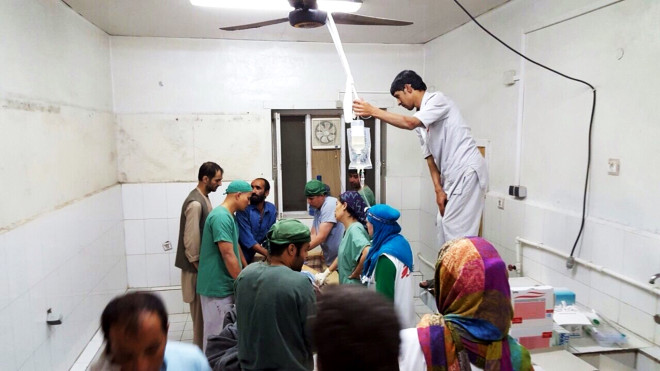
Once, the reward for leaking to WikiLeaks was nothing more than a clean conscience. Soon, it could also pay tens of thousands of dollars—at least to anyone who possesses video of the most notorious American airstrike in recent memory.
WikiLeaks has now put out a call for crowdfunded donations to assemble a $50,000 “bounty” for anyone who can give the group video evidence of the U.S. airstrike on a Doctors Without Borders hospital in Kunduz, Afghanistan, which killed 22 people and injured another 37. And WikiLeaks isn’t seeking just any video of the bombing: It wants cockpit footage and internal audio from the Lockheed AC-130 gunship that performed the attack—the same sort of highly classified internal evidence it published in 2010’s internet-shaking “Collateral Murder” video of a U.S. Apache helicopter attack in Iraq.
“The AC-130 records its attacks with high resolution gun cameras. According to military procedure, this footage should have been retained along with the cockpit audio. A post-massacre inquiry report referred to as an ‘AR 15-6′ should have also been commissioned,” reads a statement on WikiLeaks’ website announcing the crowdfunding push. “We are raising a US$50,000 bounty to obtain the footage, the cockpit audio, the inquiry report and other relevant materials such as the Rules of Engagement active at the time.”
That bounty is part of a new project WikiLeaks launched over the summer to begin offering cash to sources for the first time. That project, which WikiLeaks initially called the Prize for Understanding Good Government or PUGG, began with a call for $150,000 in donations to assemble a bounty for the first 26 chapters of the controversial treaty known as the Trans-Pacific Partnership (TPP). It followed up with 100,000 euro fundraiser for the Transatlantic Trade and Investment Partnership (TTIP).
Neither of the two crowdfunding campaigns has met its goal, though the TPP fundraiser has reached more than $113,000, and the TTIP’s has amassed than $102,000. WikiLeaks’ more modest aim of $50,000 for the Kunduz video—almost certainly a more sensitive and highly classified file than either of those treaties—may signal that it’s dialing down its financial expectations in the hopes of actually hitting one of its bounty targets.
WikiLeaks’ new bounties could raise hairy legal and security questions for the secret-spilling group. In the past, the whistleblower-focused organization attempted to avoid the appearance of requesting leaks from sources for fear of charges that it “conspired” with them to violate their secret clearances. (Its 2009 “Most Wanted Leaks” list was a notable exception.) A statement describing the group’s mission still maintains that stance. “Like other media outlets conducting investigative journalism, we accept (but do not solicit) anonymous sources of information,” the description reads. A five- or six-figure bounty for specific documents or video footage certainly seems to qualify as soliciting material.
WikiLeaks also hasn’t addressed how it will pay its sources without leaving a money trail that could jeopardize the group’s promises of anonymity. (Bitcoin, used carefully, might offer one option.) WikiLeaks didn’t immediately respond to WIRED’s request for comment on the potential problems its bounty program might raise.
Since the spring of this year, WikiLeaks has been slowly returning to form after a long period of near-dormancy. In May, it finally relaunched its Tor-based submission system after a five year hiatus. And it’s published a series of NSA leaks showing the agency’s habit of spying on American allies like France and Japan.
The new Kunduz massacre bounty shows more clearly than ever that the group wants to return to the zenith of support and acclaim it received after publishing its Collateral Murder leak in April of 2010, a video now known to have been leaked by imprisoned Army whistleblower Chelsea Manning. This time, it’s willing to pay to get there.
